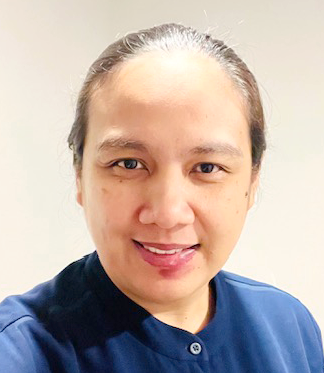Written by Sharon Aschaiek
Workplace Communication Skills for Entrepreneurship and Sales & Marketing
Occupation-specific Language Training (OSLT) courses are free workplace communication training courses for immigrants. They are available full-time or part-time, in class or online. These courses are offered at many Ontario colleges and cover a range of occupations in business, construction, health sciences, human services and technology. OSLT is funded by Immigration, Refugees and Citizenship Canada (IRCC) and coordinated by Colleges Ontario.
Maricris San Diego is a registered nurse at a hospital and cancer care centre in Hamilton. She is a charge nurse who oversees the medical surgical ward, and a preceptor who teaches new nurses. Recently, she received the Rising Star Award from Hamilton Health Sciences’ Nursing Excellence Awards.

Maricris San Diego, Charge Nurse and Preceptor
The course builds your confidence, and then you feel confident to use what you have learned at work with patients and colleagues. Using the right language and also tone.
Originally from the Philippines, Maricris practised nursing there and in Saudi Arabia before coming to Ontario in 2016 to be a caregiver. In 2019, she completed the OSLT course Workplace Communication Skills for Health Care.
The course provides practical, relevant training to internationally trained or experienced professionals in the areas of: dental hygiene, medical laboratory technology, medical radiation technology, nursing, personal support work or sleep technology.
Maricris completed the part-time course on campus at Collège Boréal in Toronto. Here, she shares about her experience.
Q: What are some of the most useful things you learned in the course about communications in a health-care workplace?
A: The language that is commonly used in a health workplace. How to have conversations with patients in ways that are clear and easy for them to understand. Communicating with professionalism.
The course also talked about how you give feedback to your colleagues, and how to document my work in reports using appropriate terminology.
The faculty also gave us samples of questions that are commonly asked during job interviews in health care.
Q: The course involves role-playing different work scenarios to practise new language skills and understand the cultural aspects of workplace communication. How helpful was this to you?
A: We set up a pretend clinic with people roleplaying as doctors, nurses and patients. In another, we had a mock job interview with a three-person panel. They were great opportunities for us to practise using our communication skills until they felt natural.
Q: How has this course been useful to you in your job as a nurse?
A: What I learned from the course about giving feedback helps me with how I teach new nursing graduates about how to communicate with patients.
The course builds your confidence, and then you feel confident to use what you have learned at work with patients and colleagues. Using the right language and also tone.
Whenever I meet somebody who’s in the process of getting their nursing licence in Canada, I recommend that they take this course, because they will learn a lot, and be able to directly apply what they learn.
If you’re an internationally educated or experienced professional, learn how OSLT can help you build your workplace communication skills and cultural knowledge: https://co-oslt.org/.
OSLT is funded by Immigration, Refugees and Citizenship Canada (IRCC) and coordinated by Colleges Ontario.






